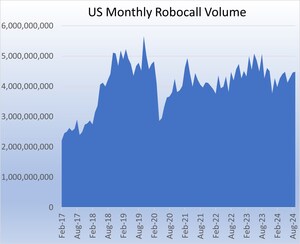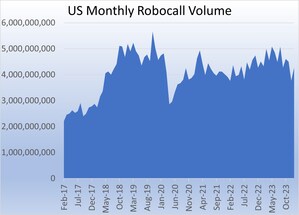Nearly 48 Billion Robocalls Made in 2018, According to YouMail Robocall Index
Increase of 56.8% In Total Robocall Volume Over 2017
IRVINE, Calif., Jan. 23, 2019 /PRNewswire/ -- The robocall problem exploded in 2018 with an estimated 47.8 billion robocalls made in the U.S., an increase of 56.8% over the estimated 30.5 billion robocalls in 2017.
"It's astonishing how many robocalls were made nationwide in 2018," said YouMail CEO Alex Quilici. "We're now talking about 150 or more robocalls for every adult in the U.S. over the course of the year, and many of these robocallers are unwanted scammers trying to trick people out of their money or personal data."
Robocalls Continue to Be Driven by Scams
The robocall problem in 2018 was driven in large part by scams and telemarketing. There were nearly 27 billion robocalls classified as scams or telemarketing, which added up to almost the total number of robocalls made in 2017 (30.5 billion).
Type of Robocall |
Estimated 2018 Robocalls |
Percentage of Total Robocalls |
Alerts and Reminders |
10.1 billion |
21% |
Payment Reminders |
11.0 billion |
23% |
Telemarketing |
8.9 billion |
19% |
Scams |
17.7 billion |
37% |
The top 10 robocall scam types for 2018 were: Health/Health Insurance Scams, Interest Rate Scams, Student Loan Scams, Easy Money Scams, Search Listing Scams, Home-Related Scams, Travel Scams, Tax Scams, Business-Related Scams, and Warranty Scams. Remarkably, the top 5 scams all made over a billion estimated robocalls for each category.
Rank |
Type of Scam |
Estimated 2018 Robocalls |
Summary of Scam |
1 |
Health/Health Insurance Scams |
5.1 billion |
Identify theft/scam payments |
2 |
Interest Rate Scams |
2.3 billion |
Identify theft |
3 |
Student Loan Scans |
1.3 billion |
Identify theft/scam payments |
4 |
Easy Money Scams |
1.3 billion |
Pay to make money/get job |
5 |
Search Listing Scams |
1.1 billion |
Pay to keep search position |
6 |
Home-Related Scams |
908 million |
Scam payments |
7 |
Travel Scams |
848 million |
Identify theft/scam payments |
8 |
Tax Scams |
783 million |
Scam payments |
9 |
Business-Related Scams |
753 million |
Scam payments/identify theft |
10 |
Warranty Scams |
679 million |
Scam payments |
"Winners" in 2018
Atlanta was the city receiving the most robocalls in 2018, with just under 2.1 billion. Six other cities had over 1 billion robocalls made to their residents: Dallas (1.8 billion), New York (1.7 billion), Los Angeles (1.6 billion), Chicago (1.6 billion), Houston (1.5 billion), and Baltimore (1.1 billion).
The 404 area code in Atlanta was the area code that received the most robocalls in 2018, with 927 million robocalls. Six other area codes exceeded 500 million robocalls: the 204 (Dallas, 727 million), the 832 (Houston, 716 million), the 678 (Atlanta, 653 million), the 954 (Fort Lauderdale, 570 million), the 917 (New York City, 546 million), and the 310 (Los Angeles, 508 million).
The state of Texas edged out California as the state receiving the most robocalls in 2018, with 5.32 billion vs. 5.3 billion. Three other states had over 3 billion robocalls made to their residents: Florida with 3.8 billion, Georgia with 3.07 billion, and New York with 3.03 billion.
Potential Trends for 2019
We project between 60 billion and 75 billion robocalls in 2019, a further increase of at least 25% over 2018, and at least double the volume in 2017, just two short years ago.
This projection is based on looking at three likely scenarios: robocall volume staying flat for 2019 vs. the last quarter of 2018; robocall volume growing in 2019 at a similar number of robocalls as 2018; and finally, having robocalls grow at the same percentage pace as 2018 vs. 2017.
Projected Robocall Volume for 2019
Scenario |
Project Volume |
Flat with Q4, 2018 |
60 billion calls |
Same volume increase as 2018 |
65 billion calls |
Same rate increase as 2018 |
75 billion calls |
Robocalling Data Source: YouMail
These latest monthly figures come from YouMail, a free robocall blocking solution for mobile phones. YouMail blocks unwanted robocallers by making sure the user's phone doesn't ring, and then plays an out-of-service message that leads them to think they dialed an invalid number. YouMail identifies problematic numbers and robocalls using a combination of its recently patented audio fingerprinting technology, call patterns, and consumer feedback.
YouMail provides the YouMail Robocall Index to estimate robocall volume across the country and for specific area codes each month. This estimate is formed by extrapolating from the behavior of the billions of calls YouMail has handled for its users, and these statistics are regularly cited by the Federal Communications Commission (FCC) as a definitive source for national data trends.
For a full ranking of cities, states and area codes, as well as details on the behavior of robocallers in each area code, please see http://robocallindex.com. To listen to actual voice messages left by robocallers, please visit the YouMail Directory. To join the YouMail Robocall Index mailing list, please write to [email protected].
About YouMail, Inc.
YouMail, Inc. is the leading provider of intelligent, cloud-based telecommunication services. The company's flagship service provides an automated virtual receptionist that replaces the subscriber's voicemail on iPhone, Android, and Windows phones. This service stops robocalls, and delights other callers by instantly greeting, routing, and responding to them, personally and memorably, and even provides free conference calls. YouMail also provides data on problematic phone number behavior, through a reverse phone lookup service that allows anyone to identify and comment on suspicious numbers, an application program interface (API) that any telecom service provider or third-party developer can use to determine whether a number is problematic, and the YouMail Robocall Index™, which since its launch in in September 2015 has emerged as the nation's definitive source on robocalling data for telecom carriers, smartphone and app companies, and public policymakers. Headquartered in Irvine, Calif., YouMail, Inc. was founded in 2007 and is privately funded.
Contact:
Keya Balar for YouMail
Lumina Communications
[email protected]
646-791-9600
SOURCE YouMail, Inc.
Related Links
WANT YOUR COMPANY'S NEWS FEATURED ON PRNEWSWIRE.COM?
Newsrooms &
Influencers
Digital Media
Outlets
Journalists
Opted In





Share this article